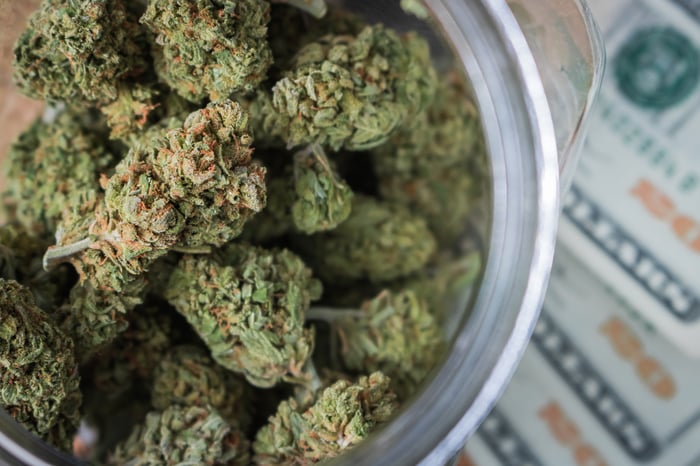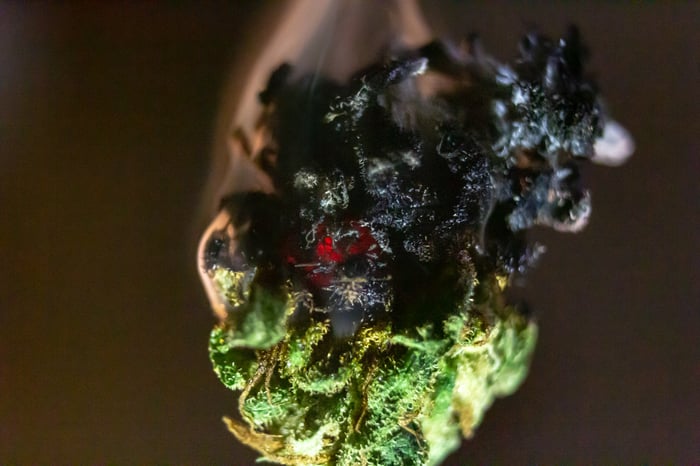Few industries are hotter at the moment than marijuana. In the U.S., 36 states have given medical cannabis the green light, 15 of which also allow for adult-use consumption. Meanwhile, Canada opened the door to recreational pot sales in October 2018. These two markets, plus Mexico, could yield in the neighborhood of $75 billion in annual weed sales by 2030.
But as investors, we also know that not every company can be a winner. Sometimes, the companies that seem to have the clearest advantages in next-big-thing investments are the ones that fall the hardest.

Image source: Getty Images.
For years, Aurora Cannabis was the most-lauded pot stock
Not even two years ago, no marijuana stock was hotter than Aurora Cannabis (ACB 18.15%). By the midpoint of 2019, Aurora had amassed 15 cultivation facilities around the globe, and it was on track to be the leading producer of cannabis. Assuming all of its facilities were built out to capacity, it could have delivered more than 650,000 kilos per year. What's more, because Aurora had a number of large-scale facilities, it was expected to yield some of the lowest-cost weed in the entire industry.
Aurora Cannabis also had plenty of global connections, with a presence in 24 markets outside of Canada. No pot stock had greater reach beyond their domestic borders. These overseas markets were viewed by the investment community as a backstop to oversupply in Canada, and a means for Aurora Cannabis to preserve its operating margins.
The icing on the cake is that Aurora brought billionaire activist investor Nelson Peltz on as a strategic advisor in March 2019. Peltz's activist background was primarily in the food and beverage industry. With higher-margin derivatives launching in mid-December 2019, and Aurora the last of the big-name Canadian pot stocks without an equity investor, it seemed clear that Peltz would help bring the company a consumer-packaged goods partner.
Less than two years later, none of this came to fruition.

Image source: Getty Images.
Put bluntly, Aurora failed
Without beating around the cannabis bush, Aurora failed to deliver.
Part of the blame for its failure lies with the federal and provincial regulators in Canada. Federal regulators were slow to initially approve cultivation and sales licenses prior to the Oct. 17, 2018, launch date for recreational pot, and they delayed the eventual launch of higher-margin derivatives (edibles, vapes, infused beverages, concentrates, and topicals) by two months.
Meanwhile, certain provinces have struggled mightily to resolve supply bottlenecks. Ontario, Canada's most populous province, relied on an ineffective lottery system to assign dispensary licenses until the end of 2019. Though a more traditional application vetting process is now in place, Ontario is still trying to catch up.
This oversupply has also completely wrecked dried cannabis flower margins. With marijuana in abundance and the black market still very much a threat to licensed producers, growers like Aurora have had no choice but to focus on value-brand pot products. Trying to go head-to-head with illicit producers hasn't worked well for Aurora Cannabis.
But the company and its management team (mostly its former management team) are to blame, too.
For example, Aurora Cannabis grossly overestimated how much capacity it would need, and the company wildly overpaid for the assets it acquired. Canada was only expected to demand in the neighborhood of 800,000 kilos of weed per year, yet Aurora had a portfolio capable of producing more than 80% of this amount by itself.
Then there were the acquisitions. Aurora's $2.64 billion Canadian all-stock deal to buy MedReleaf is hands down the worst pot stock buyout in history. After shuttering MedReleaf's smallest cultivation facility and selling off its largest greenhouse, which was never retrofit for cannabis production, the net cost to Aurora was CA$2.63 billion for 28,000 kilos of annual output and a handful of proprietary brands. This led to Aurora Cannabis taking some hefty writedowns in the 2020 calendar year.

Image source: Getty Images.
The 12,200% gain no one saw coming
But many investors failed to see the biggest risk of all: Aurora's penchant for financing everything with its common stock. Management always leaned on selling stock or using stock as collateral, whether it was the company's day-to-day operations or the dozen-plus acquisitions it entered into.
Taking into account the 1-for-12 reverse split that the company enacted in May 2020 to avoid being delisted from the New York Stock Exchange, the company had about 1.35 million shares outstanding as of June 2014. Then the rampant spending began. The craziest thing is, even with the Canadian pot industry undergoing a shake-up, the dilution that Aurora's investors are contending with hasn't slowed one bit.
On Nov. 11, Aurora announced a $150 million public offering that would see 20 million shares priced at $7.50. Two months later, on Jan. 21, 2021, Aurora announced a $125 million bought-deal financing at $10.45 a share. Putting aside the fact that both deals come with warrants that, if executed, would balloon the company's share count even further, Aurora looks to now have north of 165 million share outstanding. In 6.5 years, we're talking about an increase in the company's outstanding share count of 12,200%.
Let's put this into an even easier-to-understand context. Over the trailing four-year period (as of Jan. 22), Aurora's market cap grew by 258%. That's not a surprise given how many businesses Aurora acquired between the beginning of 2017 and mid-2019. But in terms of share price performance, Aurora's stock is down 54%. This 308-percentage-point difference between Aurora's increased market cap and its plunging stock is directly tied to its incessant share-based dilution.
Although the new management team has been aggressive with its cost-cutting tactics and has resisted the urge to make additional acquisitions, Aurora Cannabis will never be a worthwhile investment as long as the company continues to fund its operations entirely by selling its own stock.





